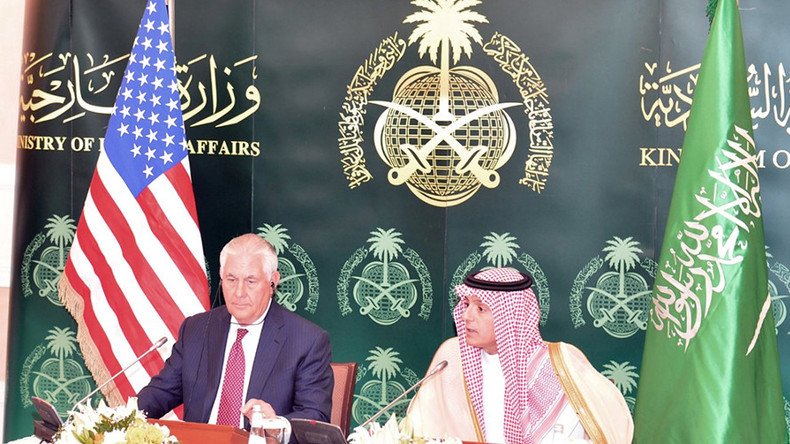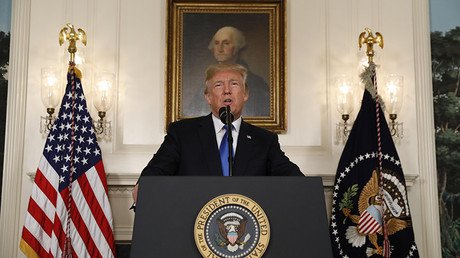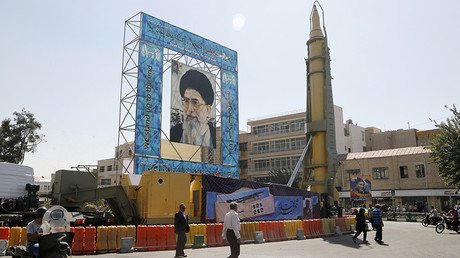‘Go home:’ Tillerson urges Iran-backed militias to leave Iraq

As the fighting against Islamic State (IS, former ISIS/ISIL) in Iraq nears its end, Iraqi Shiite militias and their Iranian advisors need to “go home,” US Secretary of State Rex Tillerson said in an apparent attempt to curb Iran’s influence in Iraq.
“Iranian militias that are in Iraq, now that the fight against … ISIS is coming to a close, those militias need to go home,” Tillerson said at a joint news conference with Saudi Foreign Minister Adel Jubeir in Riyadh following a joint meeting with senior Saudi and Iraqi officials.
“The foreign fighters in Iraq need to go home and allow the Iraqi people to regain control,” he added. Tillerson’s visit comes as part of the US efforts to contain Tehran’s influence in the region that grew over the course of war against Islamic State.
An independent and prosperous Iraq would become an obstacle to Iran's "malign behavior” in the Middle East, the US top diplomat told reporters during the press conference. However, Washington is also apparently pushing Iraq into closer cooperation with Saudi Arabia, a longtime US ally and Iraqi rival.
Earlier Sunday, Tillerson said that ties between Riyadh and Bagdad had “great potential” and remain vital for “bolstering our collective security,” adding that Washington takes “great interest in it.”
Tehran capitalized on the war on terrorism in Iraq over recent years as it funded and trained the Popular Mobilization Forces (PMF) – an Iraqi Shiite militia formed in 2014 and declared part of Iraq’s security forces. The PMF fought alongside the Iraqi Army during the liberation of Mosul and other northern Iraqi cities from Islamic State.
In contrast, the Shiite-majority Iraq and the Sunni kingdom of Saudi Arabia had strained relations for more than two decades after Saddam Hussein's 1990 invasion of Kuwait. However, the two countries have sought to improve their relations in recent years.
Saudi Arabia reopened its embassy in Baghdad in 2015 after a break of 25 years. In February 2017, the Saudi foreign minister made his first visit to Iraq. During the meeting Sunday, King Salman of Saudi Arabia and Iraqi Prime Minister Haider al-Abadi reaffirmed their commitment to restoring bilateral relations.
“We have launched a program for the future of the region based on development and security rather than the differences and wars that we have suffered,” Abadi said.
Meanwhile, Tillerson also called on other countries to stop doing business with the Iranian Revolutionary Guards Corps (IRGC), which the US itself recently added to its list of terrorist organizations.
"We are hoping that European companies, countries and others around the world will join the US as we put in place a sanctions structure to prohibit certain activities of the Iranian Revolutionary Guard that foment instability in the region and create destruction in the region," Tillerson said.
He also warned that all those who “conduct business with the Iranian Revolutionary Guard, any of their entities … really do so at great risk.” In mid-October, US President Donald Trump accused the Guards of supporting terrorism and announced “tough” sanctions against them.
Shortly after the announcement, the US Treasury “designated the IRGC under Terrorism Authority,” which would allow the US to impose sanctions on the Guards while stopping short of officially declaring them terrorists.
Less than a week later, the IRGC said that Iran would speed up and expand its missile program development in response to Washington’s hostile approach. The IRGC commander, Brigadier General Hossein Salami, said at that time that the US had long sought to isolate Iran, but that all its efforts had ended up in failure and eventually isolated Washington itself from the rest of the world.













